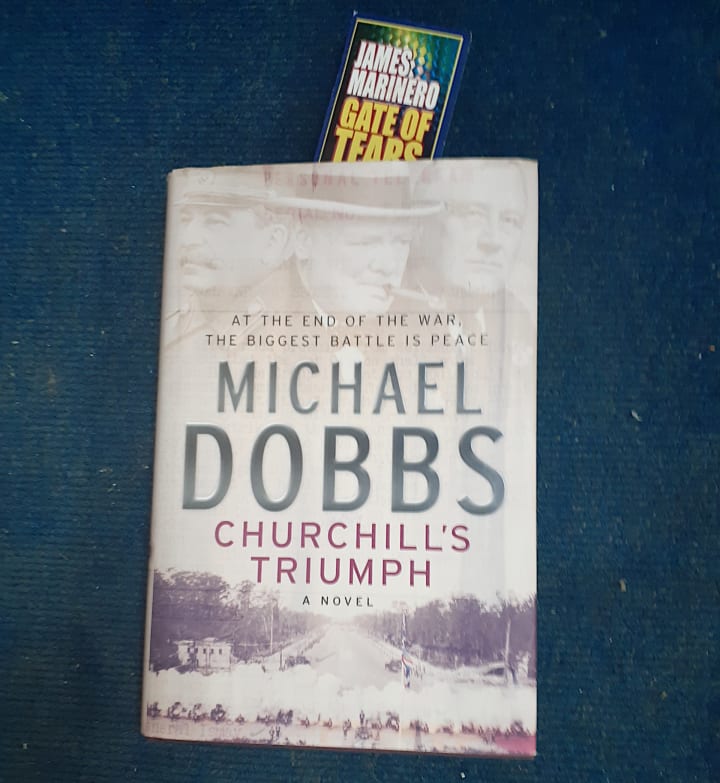Yalta - the Conference that Screwed Europe
...with a background of pink silk underwear, duplicity and adulterous affairs we're still screwed by it today

I've just been reading Michael Dobbs's book 'Churchill's Triumph'. Dobbs, creator of the 'House of Cards' series of novels is a master political and thriller novelist. Yet again, it's one of those pickups from a goodwill shop that has led me off on a safari into history.
'Churchill's Triumph' is a cleverly-woven mix of fact and fiction about the 1945 Yalta Conference. The portrayals of the characters draw on plenty of sound biographical material, although I blanched at the thought of Churchill in pink silk underwear.

That conference between Franklin D. Roosevelt, Winston Churchill and Joseph Stalin shaped the world as we know it today and explained to me some of the problems and attitudes that are now evident in Europe with Putin having tried to invade Ukraine and the Poles ready to send Leopard tanks into the fray. It also explains the German weakness of attitude to Russia over the last decades that has now rebounded on them.
The proceedings of the Yalta conference are mostly public knowledge, but what went on behind closed doors during the conference is where Dobbs has used artistic licence.
But there was real off-piste action too, with Averell Harriman (the US Ambassador to Russia a the time) and Pamela Churchill conducting an affair which led to the breakdown of her marriage to Randolph Churchill, Churchill's only son.
No matter, it is the treachery, duplicity and downright lying at the highest political levels in Yalta that is of the greatest consequence for us today.
The Yalta Conference
Although the conference was meant to solidify the alliance between the three nations and ensure peace and stability in Europe, the meeting was marred by duplicity and deception on the part of the Soviet Union.
Duplicity
One of the main reasons for the duplicity at Yalta was the fact that Stalin had already begun to solidify his control over Eastern Europe, and was in no mood to make concessions to the other leaders. He had, for example, already established a communist government in Poland, and had installed loyal puppets in other countries such as Romania and Bulgaria.
Furthermore, Stalin had begun to pressure the other Eastern European countries to form a "People's Democratic Union," which would be dominated by the Soviet Union.
At the conference, Stalin made a number of promises to Roosevelt and Churchill, including a pledge to hold free elections in Eastern Europe and to respect the sovereignty of the nations in the region. However, it quickly became apparent that these promises were empty, and that Stalin had no intention of keeping them. In fact, he continued to exert control over Eastern Europe and suppressed any attempts at democracy in the region.
Roosevelt was close to death and for his part was driven by the need to cement his legacy in the wall of history by founding the 'United Nations'.
Churchill was driven by a desire to protect the British Empire and honour his promise of protection to Poland.
The Agreements
The Yalta Conference resulted in several agreements being reached between the three leaders, though in the long term, many of them were not honoured by the Soviet Union. A secret protocol was written, but not signed by Russia, and only became public two years after the conference.
The most notable agreements were:
- The organisation of the United Nations, which would replace the League of Nations as the main international peacekeeping organisation.
- The division of Germany into four occupation zones, which would be controlled by the Soviet Union, the United States, Great Britain, and France. The plan was that Germany would be demilitarised and de-nazified and that the German people would be allowed to establish a democratic government.
- The agreement to hold free and fair elections in Poland, which would respect the rights of all Poles regardless of their background.
- The Soviet Union also agreed to enter the war against Japan, which it did in August 1945.
All these agreements aimed for the common goal of ensuring a lasting peace in the post war era, however, the reality was different. From Moscow's point of view, the agreements were perceived as a tool for Stalin to gain more power and control over Eastern Europe.

Failure
In the end, the Yalta Conference was a failure in many ways. The agreements reached at the conference were not honoured by the Soviet Union, and the free and fair elections that were promised in Eastern Europe (Poland in particular) never took place.
The Soviet Union instead installed communist puppet governments in Eastern Europe that were subservient to Moscow, and Stalin's control over the region only increased in the years following the conference.
Furthermore, the agreement to divide Germany into four occupation zones led to the eventual division of the country into East and West, with the Soviet-controlled East becoming the communist German Democratic Republic, and the Western-controlled areas becoming the Federal Republic of Germany.
This division would lead to decades of tension between the two countries, as well as between the Western powers and the Soviet Union.
Finally, the United Nations, which was supposed to be a powerful force for peace, was soon gridlocked by the Cold War, and many of its members, especially the Soviet Union, often used their veto power to block any actions they opposed.
In summary, the Yalta Conference was marked by duplicity and broken promises on the part of the Soviet Union.
In retrospect
Hindsight is supposed to be perfect, but in the case of the Yalta Agreement it is not. There is still considerable argument about the consequences and whether it was a failure of Western diplomacy.
Many historians have criticised the agreement for the way in which it dealt with Eastern Europe, arguing that the Western powers essentially abandoned the region to the Soviet Union, which led to the suppression of democracy and the rise of communist governments in the area. They argue that the agreements made at Yalta, particularly the secret protocol, allowed Stalin to solidify his control over Eastern Europe, and that the Western powers should have done more to resist Soviet expansion in the region.
Others argue that the Western leaders at Yalta were in a difficult position, as the Soviet Union was a powerful ally in the war against Germany and they were fighting a brutal war on multiple fronts, thus making it hard to resist Soviet demands. They also argue that Stalin's expansionism and control over Eastern Europe was a fait accompli at that point, it was something that had already happened on the ground and the agreements were an attempt to minimise the damage.
It's difficult to visualise a different outcome for the conference, but Dobbs's novel did highlight Roosevelt's weaknesses - both physical and moral - at the conference.
Since the end of the Cold War there has been considerable reviewing of President Roosevelt's policies toward the Soviet Union. Most notable has been the essay of Professor Arthur Schlesinger Jr., who has argued that the 1989 counter-revolution in Central Europe vindicates President Roosevelt's wartime diplomacy, which, he says, had been criticized for its "naiveté" about Stalin. - the Hoover Institution
And Churchill? He fought from a very weak position as the other two worked and schemed behind his back. His rages at their meetings were eloquent but ultimately impotent and the others knew it. As did he.
Stalin was a very shrewd, animal and ruthless operator and to me there is little question that he came out the winner by a long way.
Both Germany and the USSR carried out programs of genocide in Poland with millions of Poles being killed.
Today
Poland has always been in the squeeze: Napoleon versus Russia, Germany versus Russia. To this day, the events of those and the following years constitute stumbling blocks in Polish-Russian foreign relations. In 1989, the Soviet Union apologized for its crimes against Poland.
So what's new with Putin in charge?
In 2020, Russian President Valdimir Putin went as far as blaming Poland for starting World War II. (Wikipedia)
In my view, unlike Stalin, he has miscalculated on a grand scale, but he too is obsessed with de-nazification, this time in Ukraine.
The Ukraine War has been raging for almost a year, and renewed offensives by both sides are anticipated.
Although the focus is on Ukraine, as I said earlier, Poland is on the edge. Poland is highly vocal in its condemnation of Russia and arguably the most militant NATO country in that respect. It seems to be dragging Germany in its wake. Germany is still ambivalent about its relationship with Russia, however attitudes do seem to be hardening.
But Russia today does not have the strength or importance to the West that it enjoyed in 1945. The West simply does not need Russia and probably sees a chance to solve the problem once and for all as attitudes harden and the supply to Ukraine of tanks and perhaps aircraft looks increasingly likely with Poland in the vanguard.
Berlin is close to agreeing that Ukraine can have Leopard tanks. Maybe Leopards can change their spots.
Russia is heading towards becoming a failed state, heavily affected by widespread sanctions on its commodities, the lifeblood of its economy.
Putin is in a corner. And he has nuclear weapons.
And that is dangerous.
And the pink silk underwear?
That was worn by Churchill himself. Truly.
***

About the Creator
James Marinero
I live on a boat and write as I sail slowly around the world. Follow me for a varied story diet: true stories, humor, tech, AI, travel, geopolitics and more. I also write techno thrillers, with six to my name. More of my stories on Medium






Comments
There are no comments for this story
Be the first to respond and start the conversation.